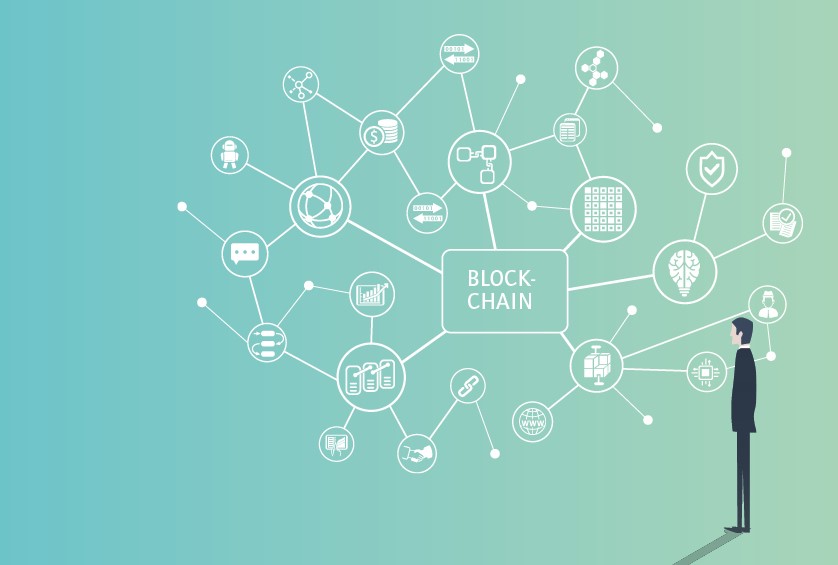5 questions about blockchain technology
“It seems that blockchain could finally deliver on one of the Internet’s oldest promises: the implementation and adoption of secure and transparent electronic business models which ensure that the agreed terms and conditions are met throughout the world”

Interview with Roman Beck
IT University of Copenhagen, European Blockchain Center
Member of the acatech HORIZONS Blockchain project group
1. How did you first come across blockchain?
I have been working on knowledge-intensive digital services and ways of trading them in networks for several years. These complex interorganisational systems have always suffered from the problem that responsibilities and incentives can be unclear, difficult to enforce or unevenly distributed.
We took a closer look at Bitcoin as an example of complex systems for a PhD student seminar in the summer of 2014. Following on from this, we started working on a use case on the Ethereum Blockchain before it had even been publicly announced. Our first prototype used blockchain technology to implement a self-service system for the coffee dispensers in a student café. We transformed what until then had been an entirely trust-based system into a system that no longer needed to rely on trust. Obviously this application was totally over-engineered, but it contained all the key elements found in other transactions.
In 2016, I organised the first Blockchain Summer School in Copenhagen, and shortly afterwards wrote a teaching case on blockchain for Harvard University. There was so much interest after the first Blockchain Summer School that the logical next step was to establish the European Blockchain Center. My workload has kept growing ever since – I am currently writing another teaching case for Harvard, working on blockchain projects for the European Commission, and putting a lot of effort into the development of blockchain standards for Denmark and with ISO.
2. What do you find interesting about blockchain technology?
It seems that blockchain could finally deliver on one of the Internet’s oldest promises: the implementation and adoption of secure and transparent electronic business models which ensure that the agreed terms and conditions are met throughout the world. Even if I don’t know the person I am doing business with, I can be certain that they will comply with the terms of our transaction and won’t be paid if they don’t.
From an academic perspective, there are still several fascinating unanswered questions. What are these systems like in terms of performance and scalability? What about the organisational management of decentralised systems? How do you embed governance and compliance in the systems? Which is the best blockchain solution for different problems? The list goes on.
In spite of all these unanswered questions, I believe it is already pretty clear that – like the Internet – blockchain will be a part of the future digital economy. That is why it is so important to start an in-depth discussion of the different blockchain applications as soon as possible.
3. What opportunities does blockchain have to offer?
There are so many, I’m not sure where to begin. The blockchain economy will bring clarity and transparency to all those areas of the Internet economy that are currently still plagued by uncertainty and confusion.
We will start to see proactive digital systems, rather than purely reactive systems that are activated by humans. Let me give you a few examples. Our fridges will securely and transparently reorder milk for us without us having to tell them to do so. In areas such as transport, we will use autonomous systems that communicate with each other securely, transparently and unambiguously in order to coordinate traffic flows. New business models and completely new economic paradigms will emerge – instead of the market necessarily being dominated by a handful of Internet giants, the big corporations will have to compete with decentralised alternatives.
Blockchain allows us to move from a system of individual companies that interact with each other to a decentralised model where we can all participate in several different companies. I often talk about this in terms of a shift from “the nature of the firm” to “the nature of human enterprises” in which we all interact as prosumers.
In the future, distributed ledger technology will provide the interorganisational operating system that underpins Industrie 4.0. Germany has a lot of ground to make up in the development of this key technology. The acatech HORIZONS publication on blockchain is an important contribution to improving understanding of this topic among policymakers and businesses.
4. What misconceptions do you typically encounter when discussing this topic?
Unfortunately, people still have lots of misconceptions and gaps in their knowledge. We need to remedy this situation as quickly as possible. The first misconception is that a blockchain is always a cryptocurrency. We also need to make people understand that there isn’t just a single blockchain technology – there are actually several distributed ledger technologies, and their number is growing all the time. Moreover, not all of them are as power-hungry as some people’s sweeping claims would have you believe. Last but not least, I often hear people argue that quantum computing will make blockchain applications obsolete. That simply isn’t true. At a lot of blockchain events, the discussion seems to be narrowly focused on Bitcoin. Unfortunately, this is more common in Germany – the debate has already moved on in other countries like Denmark. We urgently need to catch up in this respect.
5. What key points should the blockchain strategy announced by the Federal Government contain?
First and foremost, I would like to know the detailed plans for implementing the agreement signed in Brussels on 10 April by Germany and 21 other European countries concerning the establishment of a common blockchain infrastructure. Are we going to see a bold step forwards on the path towards digitalisation that truly deserves the name of a digitalisation and blockchain strategy for Germany?
We know that Germany is lagging behind other countries with regard to digitalisation. To some extent, this is reflected in the way that digitalisation is often reported as a threat in the media. We are told that it will take away our privacy and make us vulnerable to data theft and cyberattacks. While these are indeed valid concerns, they tend to overshadow the potential and opportunities for our economy and society. In actual fact, blockchain makes it possible for citizens and consumers to regain control of their data and digital profiles. Unfortunately, our German angst kicks in so quickly that the projects needed to test these systems never even make it off the ground.
Consequently, any blockchain strategy must in essence be a digitalisation strategy that promotes a positive transition throughout society. We urgently need a digital Marshall Plan to help us achieve a digital economic miracle. That is the scale of the challenge if Germany is to avoid falling further behind its international competitors and retain its place as a digital industrialised nation.
Interview series „5 questions about blockchain technology“
Also read:
Interview with Claudia Eckert, Fraunhofer Institute for AISEC
Interview with Hauke Stars, Deutsche Börse AG
Interview with Dirk Wittkopp, IBM Deutschland Research & Developement
Interview with Manfred Broy, Zentrum Digitalisierung. Bayern


